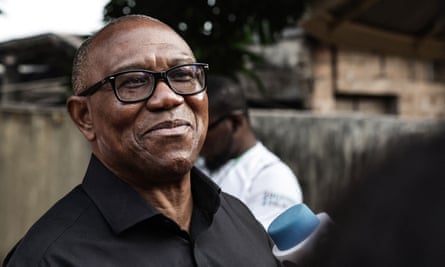Tens of millions of Nigerians head to voting booths on Saturday to decide a tight and unpredictable contest for the presidency and parliament of Africa’s most populous nation and its biggest economy.
Analysts have spoken of a “bellwether” election that could be crucial turning point after several years of worsening insecurity and acute economic troubles. Many see a credible poll and progress in tackling Nigeria’s multiple problems as key to stability across a swath of Africa.
“D-Day is here”, the Daily Post newspaper told its readers on Saturday morning, saying it has “been a long road” to the polls.
Though authorities have pledged to make arrangements for an efficient vote, The Cable told voters to prepare for a long wait with food, water and a fan to protect against the 35-degree heat.
It was also advisable to “put on plain clothes that have no affiliation with politics to avoid issues [which] political thugs might take advantage of to cause unnecessary confrontation,” the newspaper said.
Senior Nigerian government officials told the Guardian on Friday night that preparations had gone “very well’ and “everything was ready”.
Eighteen candidates are vying to replace the outgoing two-term president Muhammadu Buhari, but the main contest is between 70-year-old Bola Tinubu, from the ruling All Progressives Congress; Atiku Abubakar, of the main opposition People’s Democratic party; and the Labour party’s Peter Obi, who is leading in some polls.
Tinubu and Atiku, 76, have significant power bases across Nigeria. Both are seen as traditional politicians who will seek to mobilise voters with massive organisation and spending. Obi is seen as a reformist willing to overhaul Nigeria’s political system who has reached across the country’s many ethnic and religious faultlines.
The 61-year-old former businessman has run an insurgent campaign that relies on social media, word of mouth and the energy of his largely young following. More than 80% of the 10 million new voters who have registered for the coming poll are under 34.

“This is one of the closest elections that has ever been held in the history of this country,” Abiodun Adeniyi, professor of mass communication at Abuja’s Baze University, said.
Recent surveys have suggested Obi has between a 10% and 40% lead over his rivals, but many experts warn this could fast disappear if turnout is low, meaning a probable victory for the ruling party’s candidate.
Though the contest looks close, Nigerian electoral law makes a run-off unlikely, as the winning candidate needs only a simple majority, provided they get 25% of the vote in at least two-thirds of the 36 states.
Nigeria is suffering from multiple intersecting crises including economic turmoil, extremism and criminality affecting much of the country. In recent weeks, an effort to replace almost all Nigeria’s bank notes - in part to reduce the widespread practice of vote buying - has caused massive economic disruption and much popular anger.
Many Nigerians say they are disillusioned with all politicians, with declining turnouts in recent polls.
“I don’t want to vote for any of them. They are all the same. None of them are any good,” said Abu Bakr Ismaila, a 28-year-old vegetable hawker in Lagos.
More than 90 million Nigerians registered to vote, but only 84 million picked up the necessary documents to cast their ballots.
However, analysts point out that this is the seventh poll held since the end of military rule in 1999 and that some Nigerian democratic institutions are growing stronger. That none of the main candidates are former military officers – a first for a Nigerian poll – is also seen as an achievement.
One significant factor is new technology that identifies voters through fingerprints and facial recognition. Officials hope this will make the rigging that has historically marred polls in Nigeria much harder.
A peaceful transition of power could help roll back a tide of instability in west Africa, where Mali and Burkina Faso have both seen elected governments replaced by military regimes in the past three years.
It could also send a message to other leaders and ruling parties clinging to power on the continent. Teodoro Obiang has been in power in Equatorial Guinea since 1979, Paul Biya has ruled Cameroon since 1982, and Yoweri Museveni has held Uganda in an iron grip since 1986.
Elsewhere, it is parties that once defeated colonialism that are still in charge. The MPLA has ruled for decades in Angola, while Zanu-PF has controlled Zimbabwe since 1981.
“This is an important barometer for Africa [which] could mark the cards of other leaders and say to the dinosaurs ‘your time is up’,” Nick Cheeseman, an expert in African politics at Birmingham University, told the Guardian earlier this month.
Foreign Policy, the US global affairs magazine, recently called the election the most important anywhere in the world in 2023, describing it as “a global event – even if the world scarcely knows it”.

 1 year ago
86
1 year ago
86










 English (US)
English (US)